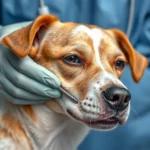
Introduction
The Akita is a majestic and powerful breed that originates from Japan, where it was originally developed for hunting and as a guardian dog. Known for their loyalty and strong-willed disposition, Akitas have gained popularity worldwide as both family pets and companions. Their striking appearance, characterized by a large, strong body and a noble head, makes them a favorite among dog lovers.
However, as with any breed, understanding Akita health issues is crucial for ensuring their well-being. These dogs are prone to certain health problems that can affect their quality of life. Knowing the common health concerns and maintaining regular veterinary care can make a significant difference in their overall health.
Common Health Issues in Akitas
Hip Dysplasia
Hip dysplasia is one of the more prevalent health issues seen in Akitas. This genetic condition occurs when the hip joint doesn’t fit into the hip socket properly, leading to joint instability and pain. It can result from a combination of genetic and environmental factors, including rapid growth and obesity.
Symptoms of hip dysplasia may include difficulty getting up, reluctance to jump or run, and noticeable pain during movement. If you notice these signs, a vet can diagnose the condition through physical examinations and imaging tests like X-rays. Treatment options range from weight management and pain relief to surgical interventions in severe cases.
Progressive Retinal Atrophy (PRA)
Progressive Retinal Atrophy is a degenerative eye condition that can affect Akitas, leading to blindness over time. This condition is hereditary and typically manifests in middle-aged dogs.
Signs to look out for include difficulty seeing in low light, bumping into objects, or an increase in anxiety when navigating unfamiliar environments. Early diagnosis by a veterinarian can help manage the condition, although there is currently no cure.
Autoimmune Disorders
Akitas are also susceptible to various autoimmune disorders, where the immune system mistakenly attacks the body’s own tissues. Common autoimmune diseases in Akitas include lupus and autoimmune hemolytic anemia.
Symptoms can vary widely depending on the specific condition but often include lethargy, skin lesions, and changes in appetite. If you notice any unusual symptoms, consulting with a vet for appropriate tests and treatment recommendations is essential.
Thyroid Issues
Hypothyroidism is another health issue prevalent in Akitas, caused by an underactive thyroid gland. This results in a decrease in hormone production, which can lead to a variety of health problems.
Signs of hypothyroidism may include weight gain, lethargy, and skin problems such as hair loss or dull coat. Treatment typically involves lifelong thyroid hormone replacement therapy, which can help manage the symptoms effectively.
Joint Issues
Given their size and build, Akitas are prone to various joint issues, including arthritis and patellar luxation. Arthritis is a degenerative disease that can cause pain and stiffness, while patellar luxation occurs when the kneecap dislocates.
To prevent or manage joint problems, maintaining a healthy weight, regular exercise, and incorporating joint supplements into their diet can be beneficial. Always consult your vet for tailored advice on managing these conditions.
Preventative Care for Akitas
Importance of Regular Vet Check-Ups
Regular veterinary check-ups are vital for maintaining your Akita’s health. It is generally recommended to take your Akita to the vet at least once a year, but more frequent visits may be necessary for older dogs or those with existing health issues.
Key health screenings can include blood tests, screenings for hip dysplasia, and eye exams, helping to catch potential issues early.
Vaccination Schedule
Vaccinations play a crucial role in preventing serious illnesses. Essential vaccinations for Akitas include rabies, distemper, parvovirus, and kennel cough. Discuss with your vet about the appropriate vaccination schedule and booster shots to ensure your Akita remains protected.
Nutrition and Diet Considerations
A balanced diet is fundamental to the health of your Akita. High-quality dog food that meets their nutritional needs is essential for maintaining a healthy weight and providing the necessary vitamins and minerals.
Additionally, incorporating supplements like omega fatty acids can support skin and coat health, while glucosamine may benefit joint health. Always consult your vet for recommendations tailored to your Akita’s specific needs.
Signs Your Akita Needs Veterinary Attention
Behavioral Changes
Changes in behavior can be one of the first signs that something is wrong with your Akita. Unusual lethargy or a decrease in activity level can indicate underlying health issues. Similarly, significant changes in appetite or drinking habits warrant a closer look.
Physical Symptoms
Physical symptoms such as sudden weight loss or gain can be alarming and should prompt a visit to the vet. Skin issues, including excessive scratching or a dull coat, can also signal health problems that require attention.
Urinary and Digestive Concerns
Be vigilant for signs of urinary tract infections, such as frequent urination, straining to urinate, or blood in the urine. Changes in stool consistency and frequency can indicate digestive issues or dietary intolerances that need veterinary evaluation.
Frequently Asked Questions (FAQ) About Akita Health
What are the lifespan and common health concerns for Akitas?
The average lifespan of an Akita is between 10 to 15 years. Common health concerns include hip dysplasia, autoimmune disorders, and thyroid issues, which can vary widely among individual dogs.
How can I tell if my Akita is in pain?
Signs of pain in Akitas can include vocalization, reluctance to move, changes in behavior, and sensitivity to touch. If you suspect your Akita is in pain, it is crucial to consult your vet for a thorough examination.
Are there specific tests I should ask my vet about?
Depending on your Akita’s age and health history, you may want to discuss tests for hip dysplasia, thyroid function, and eye exams. Regular blood work is also beneficial for monitoring overall health.
What should I do in case of an emergency with my Akita?
In an emergency, it’s vital to remain calm. Contact your vet immediately or go to the nearest emergency animal hospital. Knowing basic first aid for pets can also help in critical situations.
Working with Your Vet
Choosing the Right Vet for Your Akita
Finding a veterinarian who understands the specific needs of Akitas is essential. Look for a vet with experience in treating large breeds and knowledge of breed-specific health issues.
During the initial visit, don’t hesitate to ask questions regarding their approach to preventive care, emergency protocols, and experience with Akitas.
Building a Health Care Plan
Creating a comprehensive health care plan with your vet can help manage any chronic conditions your Akita may face. Discuss long-term strategies for conditions like hypothyroidism or arthritis, and ensure open communication regarding any changes in your dog’s health.
Conclusion
Understanding Akita health issues is essential for every Akita owner. Regular veterinary care is crucial in preventing and managing potential health problems, ensuring your loyal companion lives a long and healthy life. As responsible Akita owners, it’s vital to stay informed and proactive in health management to provide the best care possible for these noble dogs.
By being attentive to your Akita’s health and behavior, you can foster a strong bond built on trust and care.









